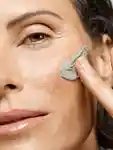MECCApedia is here to decode the science, unravel the jargon and give you the knowledge to understand the actives you're slathering on morning and night. Let your skincare education commence!
If you're a fan of smooth and glowing skin, chances are you're also a fan of exfoliation. Regularly exfoliating skin helps clear the complexion of dead skin cells, which can accumulate on the surface and leave it looking and feeling dull, dehydrated and uneven, and it also helps support skin cell turnover so that fresh cells shine through, boosting radiance and helping to even out tone.
But if you've got sensitive or redness-prone skin, you're probably hesitant to use certain exfoliating ingredients, like chemical exfoliants (including alpha hydroxy and beta hydroxy acids) or physical exfoliants (like granular scrubs, skincare brushes and muslin cloths). Enter: enzymes!
Part of the chemical exfoliant family, enzymes dissolve dead skin cells without disturbing your skin's protective barrier or pH, helping to exfoliate, brighten and tone your complexion. By smoothing skin and flaking off those useless dead cells, enzymes also clear the way for all your other skincare products – like toners, serums and moisturisers – to be effectively absorbed. But here's why enzymes are sensitive skin's best friend: unlike other chemical exfoliants, they work exclusively on the surface of the skin, so there's less potential for irritation and redness.

What are enzymes in skincare?
Enzymes operate as catalysts. Similar to how they function in our bodies — helping break down the food we eat to aid digestion — enzymes do the same thing for our skin, helping to support the cell renewal process that our skin already does naturally, but which can slow down as we age. Enzymes dissolve the ‘glue’ holding together dead skin cells on the surface of the skin, shifting them and making way for fresh, new cells to come through. This breaking down and buffing off of dead skin cells is called exfoliation.
The enzymes used in skincare are generally extracted from plants, fruits and vegetables, including green tea, pineapple (sometimes listed by its active ingredient, bromelain, on ingredient lists), papaya (‘papain’), kiwi, mango and banana (‘actinidin’), grapefruit, blueberry, cranberry and pumpkin. The most popular enzyme skincare formulas function as exfoliators and work in the same way as their chemical exfoliant cousins, dissolving the bonds that hold dead skin cells together, enabling them to be gently sloughed off without leaving your face a red, flaky mess. Enzyme exfoliation can also help to reduce congestion and the appearance of dark spots and pigmentation.
In addition to their super gentle exfoliation powers, many of these enzymes are also antioxidant-rich, which means they can help to neutralise free radicals and protect the skin against environmental damage, like sunlight and pollution, support collagen production (a must for firm and plump skin) and calm the skin.
We should probably pause here and briefly mention the other type of enzyme you may see in skincare: coenzyme Q10, or CoQ10. This is naturally produced in the body and present in every cell, where it facilitates the work of other enzymes. In skincare, CoQ10 functions as an antioxidant and behaves much like vitamin C (another powerhouse antioxidant), helping to revive and rejuvenate skin and minimise the signs of free radical damage such as uneven skin tone.
What are the benefits of enzymes for skin?
When it comes to enzyme exfoliants, there are a couple of key skin benefits. Because of their larger molecule size, enzymes cannot permeate the skin, so their refining and smoothing powers are limited to the surface – making them beneficial for those with sensitivity concerns. And they do their work without disrupting the pH balance of the skin, so they are unlikely to upset the acid mantle or skin barrier — super important for those prone to reactions and redness.
Enzymes can also be beneficial for blemish-prone skin, helping to calm and heal breakouts more quickly.
Which skin types should use enzymes?
Dry, mature and sensitive skin are particularly suited to enzymes, as they can reap the skin-smoothing benefits of exfoliation without the potential for irritation.
But enzymes are also useful for any skin type dipping a toe (or face) into exfoliation. If it’s your first time exfoliating your skin, enzymes are a great starter ingredient. They're mild but effective, so you can see how your skin reacts before moving onto other, more potent exfoliating ingredients and methods.


How do you add enzymes to your skincare routine?
A cleanser is a good way for dry and sensitive skin to incorporate low-key exfoliation into their daily routine. A water-activated exfoliant offers a sensorial experience — as you massage the product into your skin, you can feel these formulas clarifying your complexion — while an enzyme peel or mask makes for a gentle treatment that any skin type will enjoy.
And don't forget your body! Enzymes exfoliators can help minimise bumps and the formation of ingrown hairs, and de-flake dry and dehydrated limbs. Massage your enzyme body product onto dry skin and rinse off in the shower for impressively smooth and supple skin.
As with all skincare – and especially when it comes to exfoliating ingredients – it's important to patch test first, then slowly introduce the product into your skincare routine, starting at maybe one or two times per week, checking in with your skin for any reactions, and then building up usage. Always follow package instructions and, of course, make sure you're applying (and reapplying) sunscreen every single day. No exceptions.







